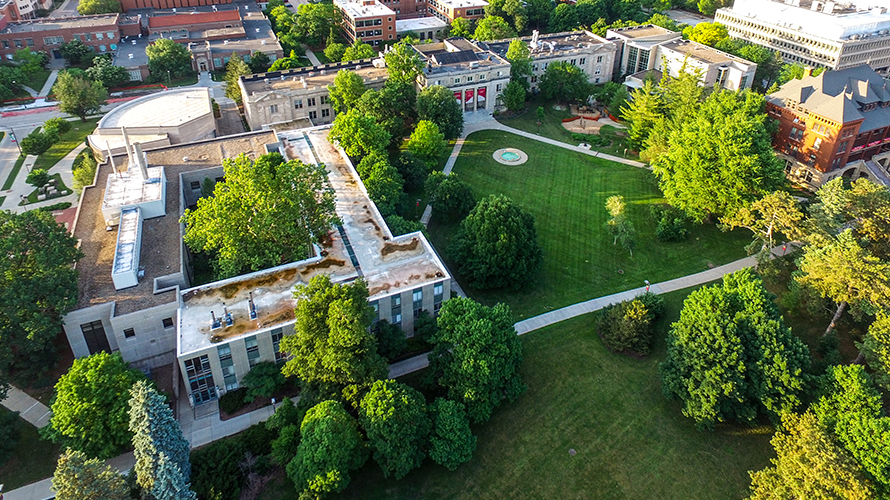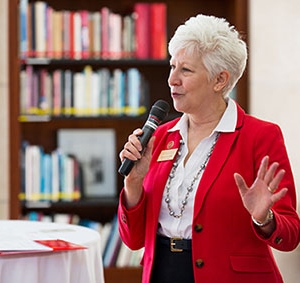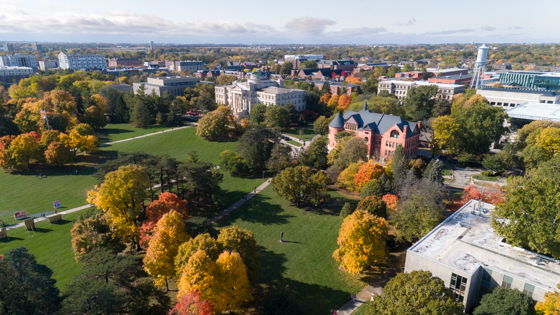Iowa Board of Regents proposes $55 million College of Human Sciences building project
10/29/2019

Iowa State University’s top capital priority for the 2020 legislative session is replacing LeBaron Hall pictured at left and renovating aging portions of adjoining 108 year old MacKay Hall center
The project was included in the Board of Regents funding request to the Iowa Legislature. If approved, $30 million in state funds would be appropriated over three years (fiscal years 2021-23) to replace 60-year-old LeBaron Hall and renovate portions of the adjoining MacKay Hall. The project includes an atrium connecting the two buildings.
The new structure would include modern multi-use classrooms, student laboratories, and research collaboration spaces to support three academic departments with nationally recognized programs: apparel, events and hospitality management; human development and family studies; and food science and human nutrition. In addition to the state support, $15 million in private gifts and $10 million in university funds are proposed to support the $55 million building project. The plan negates the need for more than $5 million in deferred maintenance of deteriorating buildings.
 “The college’s programs are ranked among the nation’s best, but our facilities no longer match the programmatic excellence,” said Laura Jolly, dean and Dean’s Chair of the College of Human Sciences. “New and updated facilities will elevate the innovative learning environments that we offer our students to foster independent and collaborative study, leadership and community building, and experiential education.”
“The college’s programs are ranked among the nation’s best, but our facilities no longer match the programmatic excellence,” said Laura Jolly, dean and Dean’s Chair of the College of Human Sciences. “New and updated facilities will elevate the innovative learning environments that we offer our students to foster independent and collaborative study, leadership and community building, and experiential education.”
Associate Vice President for Facilities Planning and Management Paul Fuligni said Iowa State will seek board permission this fall to begin planning the facility, with a goal of holding classes there beginning in August 2024.
With three stories above a full garden level, the new construction would replace LeBaron, expand its existing footprint, and enclose a courtyard. Approximately 84,000 gross square feet of space would replace 49,000 gross square feet of space. Outdated infrastructure and finishes in portions of 108-year-old MacKay Hall will also be renovated to improve accessibility, locate related programs together, and meet 21st century needs while maintaining the building’s historical elegance.
Live learning lab would set stage for entrepreneurial experimentation
The new construction will support high-tech learning, teaching, research, and outreach. A little-used outdoor courtyard will be enclosed to establish a plaza for café dining and places to study, congregate, and host special events. The plaza will be used by students, faculty, and staff in the College of Human Sciences — including more than 50 registered human sciences student organizations — as well as by members of the greater university community.
The plaza would also serve as a “live learning lab” where students can put their classroom learning into practice in entrepreneurial ways, from setting up pop-up shops for clothing they design and testing food products they develop to hosting experimental events and test marketing merchandising concepts.
“Flexible community spaces are key to expanding our culture of innovation and entrepreneurship,” Jolly said. “The plaza will become a hub of experiential student learning.”
A two-story atrium will optimize the flow of foot traffic and connect the new building to MacKay Hall and the Human Nutritional Sciences Building. The enclosed major thoroughfare will include space for collaborative and community-building activities on the main floor.
Proposal stems from long-range, strategic planning

LeBaron Hall, which appears in the lower right corner of this photo, is prominently located on Iowa State’s central campus.
The building proposal grew out of a comprehensive, long- term facilities space and infrastructure assessment for the College of Human Sciences that identified the need to expand facilities and optimize use of the central-campus area. Studies identified the need for additional space within the College of Human Sciences to accommodate new programs, increased enrollment, and changing classroom and research needs.
Undergraduate enrollment in the apparel, merchandising, and design program has grown by 9%, from 429 students in 2011 to 469 in 2019. Established in 2011, the event management program now enrolls 299 students. Registered Nurses began attending classes in the new bachelor’s of science in nursing program in August 2018.
Spaces to interact with clients using the latest technology will support practical laboratory learning and sophisticated research.
An evaluation of LeBaron Hall determined the building has realized its lifespan and lacks the space needed by the college’s expanding programs. The structural framework of the hall will not cost-effectively accommodate the retrofitting of efficient electrical and HVAC systems, innovative classroom technology, state-of-the art equipment for social sciences data collection, or accessibility upgrades.
College-wide impacts
Capital improvement projects completed over the past five years, at costs ranging from $2 million to $8 million, have improved facilities for three of the college’s five academic units, including food science and human nutrition (MacKay), kinesiology (Forker Building), and the School of Education (Lagomarcino Hall). The new proposal is designed primarily to enhance programs in the remaining academic units of apparel, events, and hospitality management (AESHM) and human development and family studies (HDFS).
All College of Human Sciences programs will be impacted by the new infrastructure, designed to support opportunities for teaching, collaboration, engagement, and interdisciplinary social science research.
In the college’s first major capital campaign since the Palmer Building opened 20 years ago, fundraising has already begun. Officials are hopeful that many loyal alumni and friends will contribute generously to help reach the goal of raising $15 million in private gifts to support the project.
“Alumni and friends understand the great value these facilities will add to the Iowa State University experience,” Jolly said. “The conversations we’ve had are energizing. I am thrilled by their enthusiastic support and look forward to sharing details about the project with many more of our stakeholders.”
Key contacts
Laura Jolly, dean and Dean’s Chair of the College of Human Sciences, 515-294-5380, ljolly@iastate.edu.